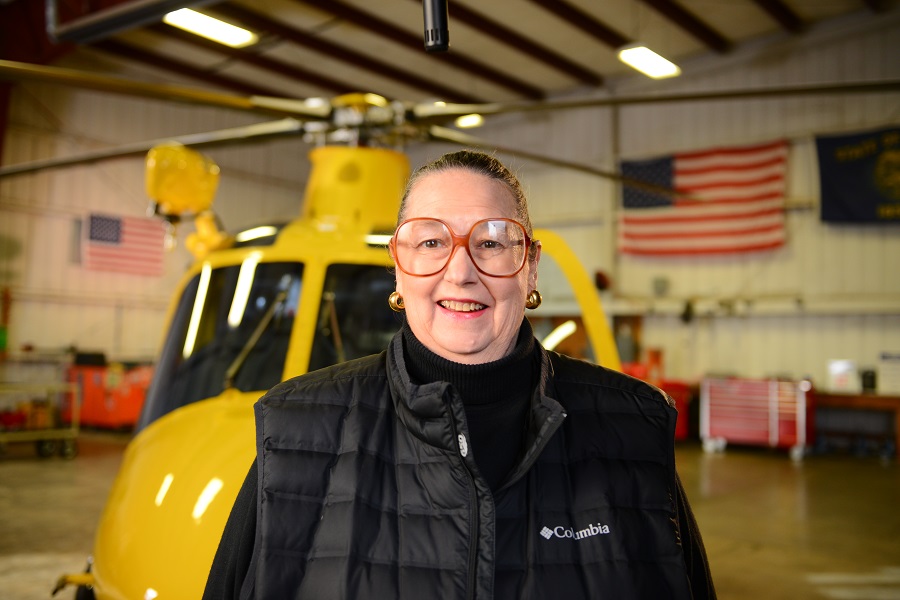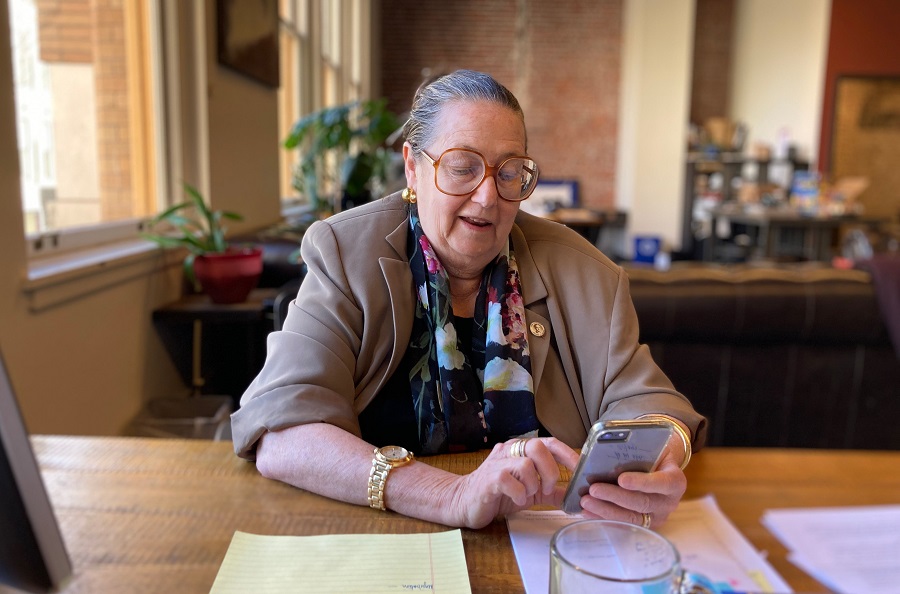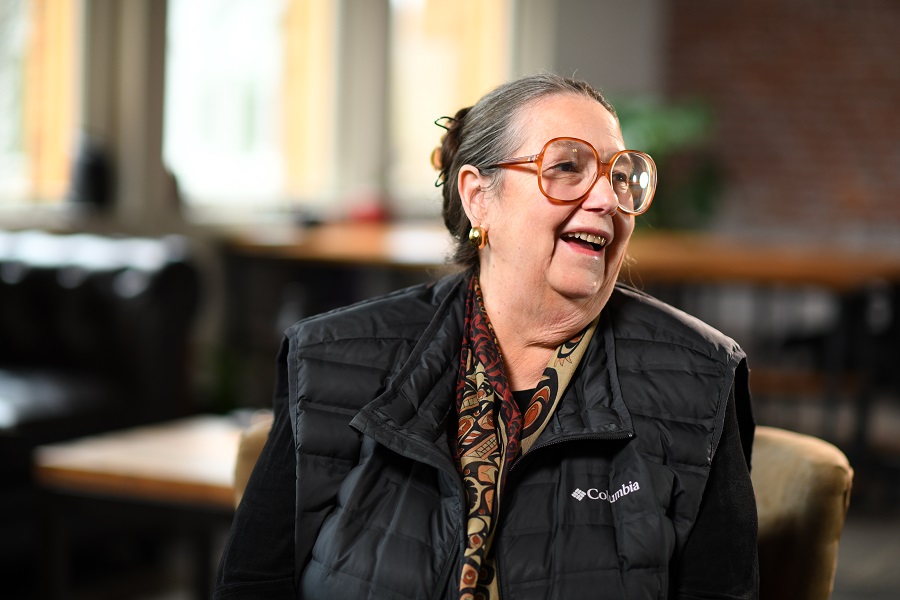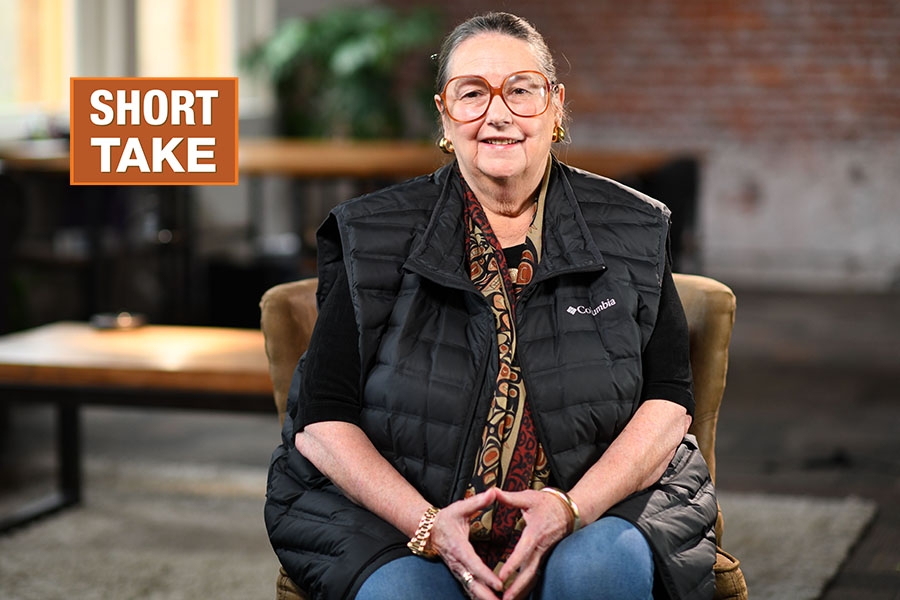The unaffiliated gubernatorial candidate says doing away with regulations and partisanship will get Oregon on the right track.
Betsy Johnson, a former Democratic state senator from Scappoose, says she is looking to upend Oregon politics-as-usual with an independent governorbid.
Feisty, good-humored and matter of fact, Betsy Johson’s campaign to unite Oregonians around a message of economic growth and pragmatism has already attracted high-profile Oregon donors, including Nike founder Phil Knight, the Pape Group, Portland developer Jordan Schnitzer and Columbia Sportswear CEO Tim Boyle.
Johnson has also nabbed the endorsements of prominent figures on both sides of the political aisle, including former Oregon senator Gordon Smith, a Republican, and former governor Ted Kulongoski, a Democrat. Margaret Carter, a former state legislator who has also served as chair of the Democratic Party of Oregon, and former state legislator Knute Buehler, who ran against Kate Brown for governor in 2018, have also expressed support for Johnson.

Credit: Betsy Johnson for Governor
If elected, Johnson would be the second independent governor in Oregon history afterJulius Meier,of the Meier and Frank family, who took office in 1931.
To get on the ballot, Johnson must collectapproximately 23,750 valid signatures, 1% of the statewide vote in the 2020 general election, a number she expects to exceed. The campaign will begin collecting signatures on June 1.
Oregon Business interviewed Johson by telephone with questions on how she would carry out her role as governor.
This Interview has been edited for length and clarity.
What do you think the Oregon voters are not getting with the parties that are currently on the ballot? What option do you think isn’t available to them that you’re providing?
Services. They’re unheard of. Only 18% of our state thinks we’re going in the right direction, the rest of them think we’re going in the wrong direction and that’s mind-blowing. (Editor’s note: Johnson appears to be referring to a DHM Research poll commissioned by Oregon Public Broadcasting in February. Of 600 people surveyed, 18% said the state was heading in the right direction, 73% said it was going in the wrong direction and 9% were undecided.) Voters aren’t very happy. And the farther out of the Portland core you get, the less happy they get.
I just don’t think they feel that they’re being served very well, by the far right and the far left. They’re the ones in the middle are feeling disrespected, ignored on heard, trampled over.
I can’t back this up numerically, but I’m just guessing that 80% of Oregonians feel as though they’re being left out.

Credit: Betsy Johnson for Governor.
Are there any policies specifically where you Oregonian voters are feeling left out?
One that I that I’m catching a lot of heat over is I voted against the cap-and-trade bill because I thought it would absolutely decimate jobs in my district. There was virtually no negotiation. It was our way or the highway.
That’s why we need an independent governor who’s going to bring both sides together and get them to work together for durable solutions that are representative of the entire state, not just Portland-centric.
A 2021 poll from the Oregon Values and Beliefs Center found 80% of Oregonians wanted to incentivize renewable energy, and over 70% supported restrictions on carbon emitters, even at the cost of economic growth. What would you say to Oregon voters who don’t think you’re enough of a climate fighter?
You can’t achieve livability if you can’t earn a living. Climate change is real, but the cap-and-trade solution was not. I’m all for producing more green energy in Oregon. I’m going to support the efforts of developers and utility companies to do more with renewables, but if we want to make real change in the climate, we need to stop making working people the scapegoats that pay the highest price for it.
I don’t want to bow to the demands of the extremists that are driving energy and policy in Salem if it means skyrocketing energy bills for Oregon’s middle-class families.
We have powerhouse engineering schools in this state. For 40 years, Oregon has led the nation on development of renewable electricity, conservation, smart buildings, and renewable gas. Nuscale, mobile, small scale nuclear reactors, were developed at OSU. There’s great work being done at Oregon Tech right now. I’m involved in an organization called OMIC, the Oregon Manufacturing Innovation Center, that combined government innovation, business, academia, to draw on that expertise.
I want to bring these experts to the table and build a sensible plan on a reasonable timeline that helps the environment and protects Oregonians.

Credit: Betsy Johnson for Governor.
Would you also fight against special interest groups who want fewer environmental regulations?
Sure. I stand up period. That’s why I think it’s important that we try to bring people together, we shouldn’t pick sides, because when we pick sides, the climate falls through the middle. We have got to forge solutions that are durable, because people don’t want to feel as though they’re having a prepackaged solution stuffed down their throats.
As governor, I want to lead a process to answer your question that would develop common-sense approaches to our energy transition, building on the expertise that we have in this state.
Another issue Oregonians are worried about is home prices, and a housing shortage of approximately 111,000 homes, according to the Oregon Office of Economic Analysis. What is your plan for increasing the housing supply in Oregon?
We need to get out of the way and reduce regulations. Developers know what they’re doing. There’s several cases I’m personally aware of where a project was stymied or stalled or canceled because of insurmountable bureaucratic regulations. I’m not saying let anybody do whatever they damn well feel like, but we’ve got to start at “yes” and work backwards from there. We start at “no,” and you must cajole and hustle and negotiate to get to “yes.”
This is a controversial statement that I’m going to make, but it may take some tactical tweaking of our land use laws. A solution is certainly not going to be created by a bunch of generalist political people in Salem guessing what the solution ought to be. State government is driving this problem with false solutions, and basically prohibitive or inhibitive regulations.
We’ve got a cost crisis because we have a land availability crisis. And when we’re building housing at $400,000 a door, to me that’s exhibit A in where we have a problem.
So you think it’s just a matter of zoning and land use that developers would rather build houses that sells for $1 million than low-income housing? Do you think that there needs to be additional incentive to get lower income housing projects built?
It could all be profitable if we didn’t have some of these Byzantine regulations. We have got to get to a point where developers have an expectation that if they put capital at risk, there’s going to be a reward.
I think what you’re asking me without asking me is, “Am I willing to push back on people that are profiteering?” Sure, we need solutions to our housing problem, but having Salem with 90 generalists isn’t a solution at all, in my view.
In addition to more housing, what measures need to be taken to alleviate the homelessness crisis that Oregon faces?
We’ve got a situation where we’re operating in silos, very well-funded silos, that are not delivering results. The Democrats are right in that we need compassion, we need housing, and we need services. The Republicans are right in that we need personal accountability, and no more tent cities.
I don’t believe that there’s one way to fix this. We’ve got various populations that are on the streets for a variety of reasons, whether it’s poverty, mental illness, drug addiction, but we are not acting with a sense of urgency. If there was a forest fire or, in the case of my old Senate District, floods, we had FEMA trailers in there almost immediately afterwards. We’re talking this problem to death while people are dying on the streets, which is a state shame on all of us.
There are lots of different models. I’ve been very personally involved in the reanimation of the old Wapato jail and trying to turn it into an emergency shelter and a place where people can opt in to a very heavily-supported series of services that help them maintain sobriety and clean living. We’re getting them jobs and it’s a very supportive environment. But we need to stop calling this a crisis and we need to start acting like it’s a crisis.
First, before assuming the governor’s office if I’m elected, I’m going to convene the proper stakeholders at the table. This includes mental health experts, drug addiction experts, social service experts, and law enforcement, to name a few.
I would hire people with I accountable timelines and deliverables and failure to perform means go find another job.
Do you have any policy on what needs to happen to homeless camps?
I’m not going to say, “On this date, this is what we’re definitely going to do.” That’s irresponsible. But we need no more tent cities. I think it’s a public health crisis. I think it is a public safety crisis.
When you see some of these tent cities that are littered with half-empty propane bottles, piles of garbage as tall as I am and open fires, it is simply inhumane. The tent cities need to go.
A 2020 report by OSU showed all Oregon counties were considered “child care deserts,” meaning there were three children for every one open childcare slot. Do you have any plans to alleviate or help Oregon’s current lack of child caregivers?
We have made delivering child care services overly bureaucratic and overly regulated. I don’t think the child care providers are getting the level of support they need from the state agency.
Too often, I’ve seen people show up with the penalty book rather than the Assisted Advanced Education book to make childcare providers better at what they do. All of us want kids taken care of in clean, enriching environments, but I have seen the agency come down on some childcare providers with an overly hard hand rather than helping to educate them back to a place where they can be better providers.
I think we’ve got to have a more flexible, nimble approach. What works in Portland isn’t going to work in coastal Oregon or other places in rural Oregon. There isn’t a cookie-cutter solution, and we need to take into account community concerns. Cost is certainly a big issue. But that’s driven by, I believe, some of the excessive regulation.
A lot of federal money is being allocated to rural broadband developments, but many urban communities, especially communities of color, are in broadband deserts because of monopolies. How do we bridge the urban-rural divide without forgetting Portlanders who don’t have access to necessities?
I think that we have got gotten to the point where Oregonians are so dissatisfied with government, that they’re kind of solving the urban-rural divide themselves. I’m being a little bit facetious here, but urban and rural Oregon are united in saying we need a better way. I believe in this day and age access to the internet is existential.
I’m unwilling to differentiate between where the need is greatest. I talked to kids during the COVID crisis who were sitting in cars at McDonald’s to get a hotspot that is unacceptable. And I don’t care whether they’re in the McDonald’s on 82nd, or they’re in the McDonald’s in the Nehalem, it’s unacceptable.
I will be a champion for economic development, cutting the bureaucracy, and cutting the regulatory hassles to get economic development. I want to be a champion for every part of Oregon, where we have unrealized opportunity.
Even if you are elected, parties will still have power in the legislature. Why should voters elect you if you don’t have a party’s support for your agenda?
I think it’s a foregone conclusion that the Oregon legislature is going to remain in Democrat hands. A Democrat governor, like Tina (Kotek), with no accountability doesn’t get us anywhere. And a Republican governor who can’t get anything done by virtue of having to work with a Democrat legislature isn’t going to move the ball down the field either.
This is an opportunity and I think a clarion call for an independent governor answerable only to the people of Oregon. I will come on to the ballot through the power of people’s signatures, which I think is incredibly powerful. And if I’m the governor, I’m going to be responsible only to the people, not to the parties. I’ve been a Republican. I’ve been a Democrat. I’m running as an Oregonian.
Right after the primary election, two of Oregon’s well-respected politicians, I’m going to call them “stewards” put aside party politics and endorsed my candidacy, former United States Senator Gordon Smith, a loyal Republican and former governor Ted Kulongoski, a loyal Democrat. I don’t want to put words in their mouth, but the two of them functionally said Oregon is at a crossroads, and we’re willing to put aside our partisanship in favor of our beloved state.
I don’t mean to sound arrogant about this, but I think I could have handily been reelected in my Senate district but having had a front row seat to what I consider the disintegration of a state I love and where I was born, I just couldn’t sit on the sidelines any longer.
To subscribe toOregon Business, click here.







